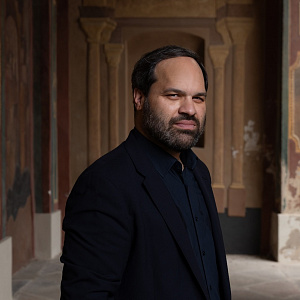
JAN BARTOŠ
GENERIC INTERVIEW


Shortly before the release of the new album by the piano virtuoso Jan Bartoš, we spoke with him about the recording that connect two close friends – Ludwig van Beethoven and Anton Reicha. Over 200 years later, their works, composed at the same time and in the same key, confront each other on a single album. Beethoven’s concerto was recorded live with the Vienna Symphony Orchestra at the Prague Spring Festival, while Reicha’s composition is heard in a studio recording with the Prague Radio Symphony Orchestra. Leading the two orchestras is the internationally respected conductor Petr Popelka.
Mr Bartoš, what does combining Beethoven’s “Emperor Concerto” with a previously unknown work by Antonín Reicha on a single album mean to you, personally?
To me personally, it means doing something terribly important because I’m an admirer of both composers. I’m also touched by the story of their friendship, so I’m glad they will be getting back together symbolically on this album. Reicha and Beethoven were born in the same year and were working in the same city. They became friends as teenagers, when they were playing together in two court orchestras and were attending university lectures.
They wrote their piano concertos in E flat major in Vienna during the same decade. While Beethoven’s “Emperor Concerto” is one of the most frequently performed works in the worldwide repertoire, Reicha’s concerto is being released here for the first time in its original, complete version, 222 long years after it was composed. Besides composing, Reicha also devoted his energy to writing theoretical works and to teaching – his students included Liszt, Franck, Berlioz, and Gounod. He had a major influence on the direction taken by European music of the 19th century. Unlike Beethoven, he had an aversion to any kind of promotion of his own works, and he refused to involve himself with organising concerts of his music. That is also one of the main reasons why so many of his works remained unperformed and unpublished. His music only began to attract attention during the latter half of the 20th century, and at present his works are beginning to appear more often on concert stages. I’m glad that with this album we can make at least some contribution towards the renaissance of his music.
Reicha’s concerto is heard here in its complete form for the very first time. What was your approach to interpreting a work that lacks any performance tradition?
Stylistically, Reicha’s piano concerto belongs to his Vienna period at the turn of the century, and it shares the same spirit as his symphonies and piano sonatas. I am also in direct contact with the editor of the critical edition Michael Bulley, and he and I have discussed some questions on details of interpretation. One can approach interpretation more freely when a work has no performance tradition, but one also feels a greater responsibility. In general, I have deep reverence and respect for tradition, but at the same time, it is not a good to be influenced or bound by tradition too much. I’m always interested in how a work speaks to the present day – to me, the most important criterion is what the music is saying “here and now”. Every work of art really has a personality of its own that develops over time. That applies not only to music, but also to all of the arts. This process is independent of the author to some degree because the passage of time reveals more and more hidden layers that were not necessarily perceptible when a work was created.
Beethoven’s music is deeply ingrained in you thanks to your teachers Ivan Moravec and Alfred Brendel. How is their legacy reflected in your playing today?
They are no longer among us, unfortunately, and I miss them terribly because they were also my friends. I studied Beethoven’s music intensively with both of them, and to this day I remember exactly what they told me and how I perceived it. Luckily, I can still return to their notes and recordings. They both regarded Beethoven as a master of notation – most things are written down very precisely in his scores. But what was important to me was seeing how they brought the composer’s instructions to life through their great imagination, and how the spirit of the music was animated in their interpretations. Every forte or accent had character and expressed something deeper.
What do you see as the importance of collaborating with the conductor Petr Popelka on both recordings?
Petr Popelka is an important conductor. I think the fact that he is now the chief conductor of both the Vienna Symphony Orchestra and the Prague Radio Symphony Orchestra gives the whole album a unified character despite the fact that Reicha’s concerto was recorded in the studio, while the Beethoven is a live recording. Petr Popelka is an unusually spontaneous and energetic conductor. Working with him was a real joy, and I believe we have been able to carry that over into our album.